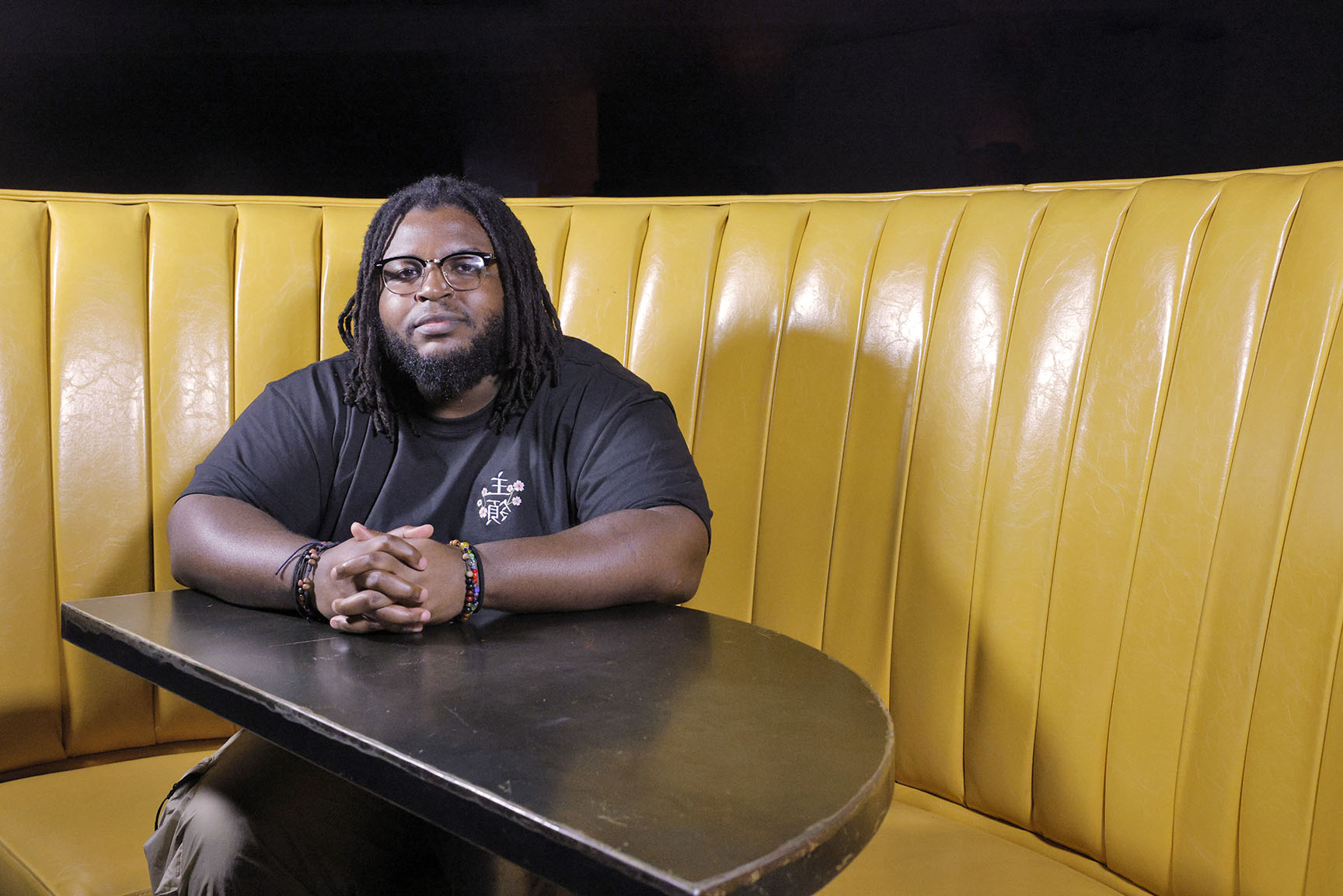
Nabil Ince, also known as Seaux Chill, is a producer, artist and educator who is “fusing together pillars of Black music (specifically gospel, jazz, hip-hop and R&B)” to create a unique sound. As the Music Director of the Festival of Nations, the annual festival in St. Louis (that was facing an uncertain future at press time), he played a key role in composing the festival’s theme song, embodying his philosophy of creating “place-based music.”
Ince has made significant contributions to the music scenes in cities like Chattanooga, St. Louis and Indianapolis. One notable project is his collaboration with Indianapolis creative David McKissic on “Deep Currents,” which received a Joyce Award in 2022 and was completed in 2023. This project celebrates the history and future of underrepresented Black urban and commercial areas in Indianapolis neighborhoods such as Martindale-Brightwood and Riverside. Ince’s storytelling and his love for the places he calls “home” are evident in his music and words.
Louis Erby III/BTT: You’re like a nomad, man. So, like, where are you originally from?
Seaux Chill: I grew up in Maryland. My parents are from Brooklyn, so I have a lot of childhood memories in Brooklyn as well.
BTT: Out of all of the cities you’ve been to, what’s one of your favorite spots, and why?
SC: I mean, I don’t want to play to the home crowd, but really, it’s St. Louis in a lot of ways, just because for me, it’s all about community and love, and there’s an abundance here in St. Louis. That’s what I appreciate the most.
BTT: I know you were the MD [Music Director] of the Festival of Nations, and I want to make sure we talk about and elaborate on the festival. What was your role? How did you approach that role, and who did you get involved from the groups and people you know through your musical journey?
SC: My role as MD was basically bringing together the house band, which was the crew from Common Hymnal. So, part of it was just organizing musicians and vocalists, and then another part was the opening ceremony, so orchestrating the music behind that and kind of like creating an experience musically that we could then collaborate with Alicia (Gbaho), who was a choreographer, to create an experience for the opening ceremony that felt unique. The whole vision was: everybody is unique, but move as one. And so that’s kind of the mindset that I was approaching everything from a music point of view. So it was orchestrating and creating all that music, and then making sure everybody was prepared to come in the week of the festival to hit the ground running with practices and all that stuff. And then because of that, I was almost like an unofficial host to a lot of the crew, just because it was a lot of their first time in St. Louis. It was a cool, I think, introduction for them to the city, to be part of the festival.
BTT: Speak on the theme song for Festival of Nations; first time they’ve ever had a theme song for that festival. Talk about the process.
SC: Part of my job was helping create the theme song for the festival. It was such an honor to be a part of. The theme for the festival was “Welcome Home,” so it made the title easy to come up with, and the direction that we want to go, easy to come up with. We had Russ Mohr in the room, Aloha [Mischeaux]; we had Bianca [Fitzpatrick] in there and myself, and then Adina [O’Neal] was in the room, as well as Hope [Thomas] and Maggie [Lu]. It was just special. It felt like the song really flowed. That was the first time all of us had really come together and tried to write a song. I mean, everybody got love for everybody. We all knew each other, so it was almost one of those things that really made sense on a relational level. Sometimes that’s a really big part of trying to co-write together. Russ came up with some chords, Aloha and Bianca came up with a lot of the melody and lyric work. We wanted people to sing along with it, we wanted something that’s super catchy that could be an earworm. So, yeah, I felt like everybody knew the mission.
I don’t know if I’ve ever really produced a song specifically in that genre in that lane, but every song—I won’t say it’s like a child—is like a special, unique thing, you know, and you can’t impose yourself onto it. I feel like you gotta let it speak to you and tell you what it wants and what it wants to do.
BTT: You’ve been involved in a bunch of different collaborative projects. How did you get involved with Common Hymnal? How has that changed your musical influence and artistry?
SC: I first got involved with them right before Covid, actually. This dude named Mal from South Africa, who was doing music during the Apartheid era, basically came to the States to initiate a similar project. It was 2019 and it was just a random meeting. I had some mutual connections in Chattanooga, so he was coming down with a crew, and we just started talking. It was a lot of philosophizing about what the project was about. And to me, it felt too good to be true. So I was pretty cautious at first; I was like, how is there space—you know, they call it the spiritual underground—where people who are looking for community and don’t really find home in traditional church spaces, are still trying to figure out their faith, and you’re telling me, there’s people like that and that are gathering and creating music together? But the more I spent time with them, the more I realized, this is legit. All of my growth as a musician, songwriter, producer, has been through Common Hymnal, just because the whole thing is built up with collaboration. So, there’s always songwriting, you know, collaborations happening on that front. It’s taught me a lot about teamwork, a lot about collaboration, just the art of collaboration and how to learn how to lean in versus how to pull back a little.
BTT: Being involved with different artists at different times, what artists or musical styles have had the most significant impact with your development as a musician, and from a national basis, big names and people you work with that everybody may not know?
SC: In general, I think the Black music and Black musicians so heavily at my foundation is hip hop, jazz and gospel; the hip hop, I have to say, Ye, like, as a producer, just the sound he’s able to develop. And then for the jazz tip, I would probably have to shout out Thelonious Monk, or Bill Evans, or even more modern-day, like Kamasi Washington; gospel, Kirk Franklin. And then also international Black music. I’m 25% Trini, so I got some Caribbean influence. Obviously, Afrobeat is pretty big. Truly and honestly, Root Mod has been like, life-giving for me to just listen to the music and just the love that comes out of the band.
BTT: Can you talk about Beloved?
SC: Absolutely. We’ve been building a relationship with the King Center going back to early last year, and they were saying that it would be good to have a song to help support their Beloved movement. And so during the songwriting camp that we had, that was one of the objectives, to write a Beloved song. It was one of those things where someone at the piano started to play some chords, and then my boy Jalen Seawright came up with a lyric and melody that felt right. It was really cool to see that process from songwriting rooms to production to vocals to getting it out, and we were able to perform it at the Beloved Community Awards in Atlanta, which was just really cool, because we got to meet with Dr. Berniece King. And it just feels kind of crazy to have a small part of such a big legacy that is Dr. King.
BTT: Tell us what you got coming up and could you tell us about anything that you recently put out or are preparing to put out?
SC: Actually, Common Hymnal, we put out a new song today [March 14, 2025] called “God Will Prevail,” just like a classic gospel song. We put out a lot of different sounds. This one is specifically gospel, so that’s fun. I just got through tracking some vocals for my homey’s project, which is like a meditative R&B type of project, so we cookin’ up some stuff. There’s things that are brewing. It always feels good just to feel like there’s forward motion, collaboration with making music.
